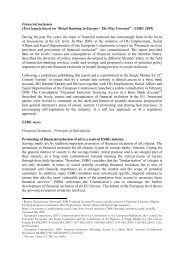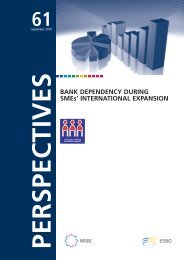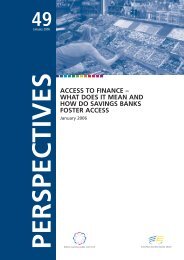3.2. Public banksPublic banks are of special interest, given their relative importance inthe WSBI membership: they represent 57 percent of WSBI members, <strong>and</strong>55 percent of their assets. The BCBS (2006 <strong>and</strong> 2010b) subjects them <strong>to</strong>the same general principles of sound governance as the ones that apply<strong>to</strong> any other bank, because the Committee believes that state-ownedbanks may face many of the same risks associated with weak <strong>Corporate</strong><strong>Governance</strong> than private banks (paragraph 19 of BCBS, 2010). Therefore,the Basel Committee concludes that “the general principles of soundcorporate governance should also be applied <strong>to</strong> state-owned or statesupportedbanks, including when such support is temporary (eg duringthe financial crisis that began in mid-2007, national governments <strong>and</strong>/orcentral banks in some cases provided capital support <strong>to</strong> banks)” 12 .This does not preclude the possibility <strong>to</strong> determine explicit soundgovernance principles for government-owned entities, as described byOECD (2005) for public companies in general. The BCBS documents(2006 <strong>and</strong> the 2010b) also note three specific principles relevant forgovernment-owned banks, which are:nnIn this type of bank a potential conflict of interest could take placeif it is both owned by <strong>and</strong> subject <strong>to</strong> banking supervision by a stateinstitution. Should this be the case, then there must be a fulladministrative separation of the ownership <strong>and</strong> banking supervisionfunctions <strong>to</strong> minimize political interference in the supervision activities(paragraph 59, Principle 3 of BCBS, 2010). Under a sound regula<strong>to</strong>ryframework, the role of the supervisor is essential in this regard.For instance, in the case of BancoEstado (Chile), a government-ownedbank member of WSBI, “the risks of political interference are partiallymitigated by a rigorous prudential supervision by the Chilean bankingsupervisor”, as stressed by Rudolph (2009).Governments should not participate in the daily management ofpublic banks, but respect the independence of the board. The lattermust maintain its responsibilities outside political influences that couldlead <strong>to</strong> conflicts of interest (for example, when direc<strong>to</strong>rs explicitlyrepresent political interests or are public officials).12 Most public banks considered in this section are state-owned institutions, with theimportant exception of the German Sparkassen, where the Municipality is the “Traeger” –a German term that can be translated as “supporting or responsible institution” –, but notthe owner. See Annex 2.50
nHowever, this does not mean denying the right of the government asan owner <strong>to</strong> set the bank’s overall objectives (paragraph 20, Principle1 of BCBS, 2006).Where a bank is state-owned, disclosure policy should include “anownership policy that defines the overall objectives of state ownership,the state’s role in the <strong>Corporate</strong> <strong>Governance</strong> of the bank, <strong>and</strong> how itwill implement its ownership policy” (paragraph 50, Principle 7 ofBCBS, 2006). It is important in this regard <strong>to</strong> stress the need for a cleardefinition of the mission <strong>and</strong> objectives of public banks.Amongst government-owned banks, postal savings institutions are animportant category of WSBI members, especially in Africa. A number ofthem are currently facing institutional reform with a view <strong>to</strong> turn themin<strong>to</strong> proficient <strong>and</strong> competitive financial institutions, acting as keyintermediaries for financial inclusion, across the country. A crucialcondition <strong>to</strong> reach this objective is the development of efficient <strong>and</strong>transparent mechanisms, which will ensure full independence of themanagement <strong>and</strong> Board of Direc<strong>to</strong>rs from political influence.The government's influence over the banking system is not confined <strong>to</strong>ownership. As mentioned above, it has a significant influence throughregulation, <strong>and</strong> can also have an impact by adopting other controls orconditions, such as the establishment of m<strong>and</strong>a<strong>to</strong>ry ratios <strong>and</strong>/ or limits onoperations, either <strong>to</strong> their amount or the prices (e.g. interest rate ceilings).The influence of the state in the banking system is not only a question ofsound governance, but also one of efficiency. Thus, it is necessary <strong>to</strong>avoid any sort of undue influence that may cause a deterioration of theefficiency (<strong>and</strong> therefore the long term stability) of the financial system,such as (i) an unfair competitive advantage for public-owned banks,(ii) a bias in the financing <strong>to</strong>wards the public sec<strong>to</strong>r, (iii) the provisionof liquidity <strong>to</strong> the public sec<strong>to</strong>r in privileged terms or (iv) the lack ofindependence of the board of direc<strong>to</strong>rs <strong>and</strong>/ or the management ofpublic banks. In the particular case of Postal Banks, “it is crucial <strong>to</strong> put inplace efficient <strong>and</strong> transparent mechanisms which will ensure fullindependence of the management <strong>and</strong> Board of Direc<strong>to</strong>rs of the postalsavings institution from political influence <strong>and</strong> clear supervision rules <strong>and</strong>responsibilities” (WSBI, 2010).51
- Page 6 and 7: BoxesBox 1. German Sparkassen 27Box
- Page 9 and 10: EXECUTIVE SUMMARYBackground and obj
- Page 11 and 12: nnAccess to Finance in enshrined in
- Page 13 and 14: Chart A.Corporate Governance, Acces
- Page 15 and 16: nThe study also shows that Corporat
- Page 17 and 18: 1. INTRODUCTION1.1. Focus and objec
- Page 19 and 20: WSBI members are by definition acco
- Page 21 and 22: For the particular case of developi
- Page 23 and 24: 2. THE LINK BETWEENCORPORATE GOVERN
- Page 25: Table 2. Main features of the Missi
- Page 28 and 29: Access to financeSparkassen promote
- Page 30 and 31: All these examples illustrate how p
- Page 32 and 33: In the case of Peru, the profits th
- Page 34 and 35: Among the WSBI institutions that re
- Page 36 and 37: BOX 2. KENYA POST OFFICE SAVINGS BA
- Page 38 and 39: The fact that the banking system is
- Page 41 and 42: 3. CORPORATE GOVERNANCE -CONCEPTUAL
- Page 43 and 44: Figure 2. Sound Governance of Finan
- Page 45 and 46: As can be seen in the figure above,
- Page 47 and 48: nnnAt the same time, the distance a
- Page 49: The first two elements (the ownersh
- Page 53 and 54: Cooperatives are similar to mutuals
- Page 55 and 56: 3.4. FoundationsFoundations do not
- Page 57 and 58: 3.5. Good Corporate Governance prac
- Page 59 and 60: F. DISCLOSURE AND TRANSPARENCYPrinc
- Page 61 and 62: 4. ACCESS TO FINANCE -CONCEPTUAL FR
- Page 63 and 64: 4.1. Financial deepening and improv
- Page 65 and 66: The board does not have any executi
- Page 67 and 68: In other words, sustainable financi
- Page 69 and 70: The following table shows how the W
- Page 71 and 72: The fourth dimension refers to the
- Page 73: Table 8. Access to Finance in the f
- Page 76 and 77: Only 27 members established in 21 c
- Page 78 and 79: nnDCI (Depth of credit information
- Page 80 and 81: 5.2. Corporate Governance and Acces
- Page 82 and 83: 5.2.1. Corporate Governance and Ave
- Page 84 and 85: Chart 8.Specific Corporate Governan
- Page 86 and 87: 5.2.2. Corporate Governance and Ave
- Page 88 and 89: Chart 13. Corporate Governance comp
- Page 90 and 91: Chart 16. Corporate Governance Inde
- Page 92 and 93: Chart 19. Specific Corporate Govern
- Page 95 and 96: ANNEX 1: REVIEW OFTHE LITERATUREThe
- Page 97 and 98: Even among the relatively narrow un
- Page 99 and 100: Figure A.1. Structure of agents' re
- Page 101 and 102:
The table captures the essence of s
- Page 103 and 104:
A case study built by Clarke et al
- Page 105 and 106:
A very recent contribution to the d
- Page 107 and 108:
For example, in Latin America, WSBI
- Page 109 and 110:
The paper examines whether a poor e
- Page 111 and 112:
For the survival of microfinance in
- Page 113 and 114:
ANNEX 2: CASE STUDIES 32CASE STUDY
- Page 115 and 116:
It is one of the major characterist
- Page 117 and 118:
Although Sparkassen are legally and
- Page 119 and 120:
Figure A.2. Corporate Loans Market
- Page 121 and 122:
Financial education is also an impo
- Page 123 and 124:
Corporate GovernanceKPOSB is wholly
- Page 125 and 126:
Among the initiatives that the gove
- Page 127 and 128:
Related to the concession of credit
- Page 129 and 130:
OPERATIONS1. Deposit Base: It was p
- Page 131 and 132:
Corporate GovernanceThe Central Ban
- Page 133 and 134:
To address the problem of capital,
- Page 135 and 136:
Financial inclusion ranges very hig
- Page 137 and 138:
CASE STUDY 4:SPANISH SAVINGS BANKS
- Page 139 and 140:
The uniform financial regulation of
- Page 141 and 142:
Figure A.3. Governing Bodies - Span
- Page 143 and 144:
The web-based tool www.rededucacion
- Page 145 and 146:
On the liability side, CMAC offer m
- Page 147 and 148:
A specificity of CMAC is that the m
- Page 149 and 150:
Table A.3.MissionMissionCMAC AREQUI
- Page 151 and 152:
As of September of 2009, the twelve
- Page 153 and 154:
Furthermore, the consensus culture
- Page 155 and 156:
ANNEX 3: QUESTIONNAIREQUESTIONI. Ge
- Page 157 and 158:
ANNEX 4:THE HONOHAN INDEX 43COMPOSI
- Page 159 and 160:
COMPOSITE MEASURE OF ACCESS TO FINA
- Page 161 and 162:
ANNEX 5:QUANTITATIVE RESULTSCountry
- Page 163 and 164:
Overall Corporate Governance IndexO
- Page 165 and 166:
REFERENCES- Andrianova, S., Demetri
- Page 167 and 168:
- FSD Kenya (2009), Financial Secto
- Page 169 and 170:
- World Bank (2006) The Role of Pos
- Page 172:
WSBI - ESBG - The Global Voice of S
















